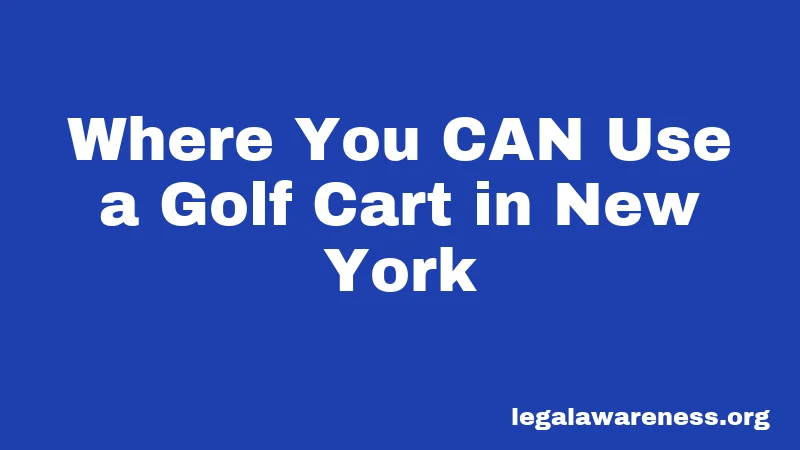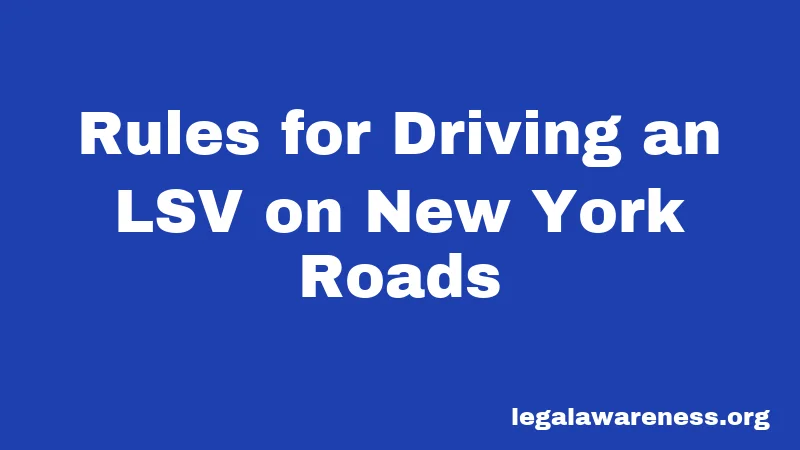Golf Cart Laws in New York (2026): Why You Really Need to Know This
Most people have no idea how strict New York is about golf carts. Seriously. You might see them around private golf courses or gated communities. But here’s the thing—traditional golf carts cannot be registered with the New York Department of Motor Vehicles (DMV), which means they’re illegal on public roads. The penalties? Yeah, they can hit hard. Let’s break down exactly what you need to know.
You’re not alone if this surprises you. A lot of New Yorkers think they can just hop into a golf cart and cruise around town. But New York has different rules than most states when it comes to these vehicles. The good news? There’s a legal alternative if you really want to use something cart-like on the road. We’ll get to that.
What Is a Golf Cart, Anyway?

Think of a golf cart as a small motorized vehicle designed to carry people around a golf course or private property. It’s basically a low-speed vehicle that goes around 20 mph (sometimes a bit less). Golf carts are great for golf courses, private driveways, gated communities, and resort areas. But they weren’t designed with street safety in mind. That’s the main issue New York has with them.
Now here’s where things get interesting. There’s a separate category called Low-Speed Vehicles (LSVs). These look similar to golf carts. But they’re built with safety features golf carts lack. We’re talking headlights, proper brakes, seat belts, turn signals—the whole package. That difference? That’s huge when it comes to the law.
The Basic Rule: Golf Carts Are Not Street-Legal
Let’s get straight to it. You cannot register or operate a golf cart on any street, highway, parking lot, sidewalk, or another area in New York State that allows public motor vehicle traffic. If you do, you may be arrested. Yes, arrested.
This applies to standard golf carts. Even if they’re electric. Even if they’re in great condition. New York doesn’t allow registration for regular golf carts. Period. So technically, driving one on public roads is illegal, full stop.
Wondering if this applies to you? If you own a regular golf cart and want to use it anywhere except private property, keep reading. This matters.
Where You CAN Use a Golf Cart in New York

Okay, so golf carts aren’t completely banned. Just banned on public streets and roads. Here’s where you can actually use them:
On private property, golf carts are totally fine. Your own driveway? No problem. A private gated community? That’s usually allowed. Golf courses and resorts? Definitely okay. Private roads and developments? Yes. The rule is simple: if it’s not public property, you’re likely good.
But here’s the catch. Some cities and towns have created special exceptions. These are rare, but they do exist. For example, the village of Greenwood Lake (in Orange County) has authorized the use of golf carts on certain streets under the village’s control. This is a specific exception made just for that village, though. It doesn’t apply statewide.
If you live in a community, check with your local municipality. They might have special rules or permits. But even if your town allows golf carts on certain roads, those permissions don’t extend to state highways or county roads. Local-only applies here.
The LSV Alternative: Your Legal Option
Here’s the solution if you want something cart-like on the road. Low-Speed Vehicles (LSVs) are legal in New York. LSVs look similar to golf carts, but they’re not the same thing legally. An LSV is a limited-use automobile or truck with a top speed over 20 mph but not over 25 mph and weighing under 3,000 lbs.
LSVs can be registered with the DMV. They can be driven on public roads. They come with special plates marked “LSV.” That’s the official green light from New York.
What makes the difference? Safety features. LSVs must have seat belts, headlights, brake lights, turn signals, rearview mirrors, and a windshield. They also need proper equipment like a horn and parking brake. Plus, they need certification from the manufacturer that they meet federal safety standards.
Sound complicated? It’s actually pretty straightforward once you know what you’re looking for.
Rules for Driving an LSV on New York Roads

If you own an LSV (or are thinking about converting a golf cart to LSV specifications), here’s what you need to know.
Speed limits matter. LSVs can be driven on public highways with speed limits of 35 mph or lower, and may cross larger roads at intersections. You can’t take an LSV on a busy highway where everyone’s going 55 mph. That’s not allowed. But neighborhood roads and local streets? Perfect.
You need a driver’s license. There’s no special golf cart license. If you’re 16 or older with a valid driver’s license, you can operate an LSV. Teenagers with junior licenses can drive them too, assuming they follow all their junior license restrictions.
Registration is required. Just like a regular car, your LSV needs to be registered with the New York DMV. You must have valid ownership papers, including a title, to register your LSV, plus proof of insurance.
Insurance is mandatory. New York’s no-fault insurance laws apply, meaning you need at least the minimum liability coverage for an LSV. This is important. Without insurance, you can face serious penalties.
Hold on, this part is important. Make sure your LSV is actually on the state’s approved list. Not every vehicle that looks like a golf cart qualifies. You can contact the NYS DMV Technical Services at 518-474-5282 to confirm whether a specific vehicle is certified and approved.
What About Private Property Use?
This is actually pretty simple. On private property, golf carts don’t need registration. No license required. No insurance needed. You can give someone a ride in your golf cart on your own property without worrying about any of these rules.
Your neighbor’s property? Still private. As long as you have permission, you’re fine. Same with private roads in gated communities. These vehicles are totally cool on private land.
But the moment you cross onto a public street or highway? That’s when the laws kick in. And that’s where you need a registered vehicle.
Penalties for Breaking the Rules
Let’s talk about what happens if you ignore these laws. Because honestly, it’s serious.
If you drive an unregistered golf cart on public roads, you could face fines. Violations can result in speeding tickets, drunk driving fines, and reckless driving situations. Some violations can also lead to your vehicle being confiscated or impounded.
More serious offenses? In some cases, authorities have warned that you could face a year in jail for driving your golf cart on public streets. That’s extreme, but it shows how seriously New York treats this.
Operating an unregistered or uninsured vehicle can also impact your driver’s license. You might face points on your record. Insurance rates could go up. The legal consequences add up fast.
Pretty straightforward. The best move? Just follow the law. If you want to use something on public roads, make sure it’s registered as an LSV.
Local Rules Matter More Than You Think
Here’s something a lot of people miss. Your town or city might have its own rules that are even stricter than state law.
Some municipalities have banned LSVs on certain roads. Others have restricted them to specific hours (like daytime only). Some communities require additional safety equipment beyond what the state mandates. One town might allow LSVs everywhere within 35 mph zones. The next town might limit them to 25 mph zones.
You need to check with your specific city or village. Call their town hall. Look up local ordinances online. Ask local law enforcement. Don’t assume state rules are the same as your community’s rules.
This is actually important. Your municipality can be stricter than the state. But they can’t be more lenient. So always check local first.
How to Register an LSV in New York
Thinking about registering an LSV? Here’s what you need to do.
First, make sure your vehicle actually qualifies. It must meet federal motor vehicle safety standard specifications with a certified top speed capability and all required equipment. If it’s a used vehicle, you’ll need manufacturer certification.
Second, gather your documents. You’ll need a title or proof of ownership. You’ll need proof of insurance. You’ll need the vehicle’s VIN (vehicle identification number). Basically, anything proving you own it and have coverage.
Third, visit your local DMV office. You’ll fill out a vehicle registration/title application. You’ll present all your documents. You’ll pay the registration fees. The DMV will issue you plates with “LSV” on them.
It’s not super complicated. But it does take a little time and paperwork. Worth it though if you want to legally use your vehicle on roads.
Safety Features Required for LSVs
Let’s break down what an LSV actually needs to have on it to be legal.
The basics: headlights and brake lights. Turn signals on both sides. Rearview mirror. Side mirrors. A windshield. A working horn. Seat belts for each passenger. A parking brake. Even reflectors for nighttime visibility.
New York requires seat belts at each seating position, and these are non-negotiable equipment on low-speed vehicles.
If your vehicle is missing any of these, it won’t be approved for registration. You can’t just remove a mirror because you like the look. That would disqualify it immediately.
These safety features exist for a reason. They keep you safe if something goes wrong. So take them seriously.
Common Questions About Golf Carts in New York
Can I register a regular golf cart as an LSV?
No. Your golf cart would need to be manufactured or certified to LSV specifications. You can’t just add some lights and call it an LSV. It needs manufacturer certification that it meets federal safety standards. Most regular golf carts don’t meet these standards.
What if I modified my golf cart to be safer?
Even with modifications, you probably can’t register it. The vehicle itself needs to be certified by the manufacturer. Custom modifications don’t count. It has to come from a company that manufactures it to LSV specs from the start.
Can teenagers drive an LSV?
Yes, if they have a valid driver’s license (including a junior license at 16). No special permission needed. But they follow the same rules as adult drivers. Speed limits, road restrictions, all of it.
Do I need special insurance for an LSV?
No special type, but yes, you need insurance. The same liability coverage you’d get for a regular car works fine. New York requires this by law.
What about electric golf carts specifically?
The law doesn’t care if it’s electric or gas-powered. The rules are the same. It either qualifies as an LSV or it doesn’t, regardless of how it’s powered.
Can local towns completely ban LSVs?
They can restrict where they’re allowed. But they can’t override state law entirely. If the state allows LSVs on 35 mph roads, a town can require them to stick to 25 mph roads instead. But they can’t say “no LSVs anywhere.” That would contradict state law.
Where can I find the approved LSV list?
Contact the NYS DMV Technical Services at 518-474-5282. They can tell you if a specific vehicle is on the approved list.
What If You’re Caught Driving an Unregistered Golf Cart?
Let’s be real about this scenario. You’re driving an unregistered golf cart on a public street. A police officer pulls you over. What happens?
First, you’ll be cited. Driving an unregistered golf cart on public roads can result in fines. The exact amount depends on local ordinances and what else might be involved (like reckless driving or endangering others).
Your vehicle could be impounded. You’d have to pay to get it back, plus storage fees and possible towing charges.
If you don’t have a driver’s license, that’s another violation. If you don’t have insurance (and you’re in an LSV), that’s a separate fine and possibly a suspended license.
Worst case? You could face jail time, especially if someone got hurt or if it’s a repeated offense.
This isn’t meant to scare you. It’s meant to show you that this isn’t a minor issue. New York takes vehicle registration seriously. Don’t gamble with it.
Special Circumstances in New York
Golf courses and private resorts: Totally fine for golf carts. No registration needed. These are the actual intended use.
Gated retirement communities: Often have their own rules. Many allow golf carts. Some might have restrictions. Check with your community’s management.
Seasonal communities: Towns like some areas in the Adirondacks or Catskills might have special rules. Always check local.
Disabled individuals: If you have an ADA-compliant mobility device, different rules might apply. Contact your local DMV for specifics.
Recently changed law: As of late 2024 and early 2025, New York hasn’t significantly changed its golf cart regulations. The rules we’ve covered here are current and accurate.
Honestly, this is the part most people mess up. They assume their situation is special. But unless your vehicle is officially certified, or unless your community has a specific exemption, the standard rules apply.
Final Thoughts
Here’s the bottom line: regular golf carts are not street-legal in New York. Period. Don’t drive one on public roads or you could face fines, confiscation, or worse.
But there’s a legal way forward. Low-Speed Vehicles that meet New York standards can be registered and driven on certain roads. They’re not quite the same as a golf cart, but they’re similar and totally legal.
The best move? Check your local rules. Call your town hall. Contact the DMV if you’re unsure about a specific vehicle. Know the rules before you buy or drive anything.
New York’s laws exist to keep roads safe. Follow them, and you’ll be fine. Now you know the basics. Stay informed, stay safe, and when in doubt, reach out to your local DMV or law enforcement.
References
- New York State DMV – Electric Scooters and Bicycles and Other Unregistered Vehicles
- New York State Senate Bill 2023-S8513 – Village of Greenwood Lake Golf Cart Authorization
- New York State Department of Motor Vehicles – Technical Services: 518-474-5282
- NY DMV Contact and Office Locations
- New York Vehicle and Traffic Law – General Regulations
